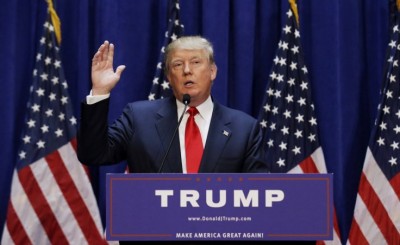Fantasies of Impeachment and Protest: Continued Media Misreadings of Donald Trump

In an age where many pundits and pollsters ought to be put out to an ignoble pasture, predictions and astrology gazing on the US election continues. While he did have a better sense of this election than most, actually predicting the result, Michael Moore has decided to essentially ignore it except in the negative.
On MSNBC’s Morning Joe, Moore took another stab at reading the future. “Here’s what’s going to happen, this is why we’re not going to have to suffer through four years of Donald J. Trump, because he has not ideology except the ideology of Donald J. Trump.”
The thesis is not entirely credible, but Moore layers it with the rationale of narcissism. As in ancient Rome, imperial ego eventually leads to downfall. Being “so narcissistic where it’s all about him, he will, maybe unintentionally, break laws. He will break laws because he’s only thinking what’s best for him.” Shades of Richard Nixon here: if the US President does it, it must be legal.
Others focus on the internal dynamic of the Republican Party. Within the structure of the organisation lie kingmakers and potential assassins (in the political context). For historian Allan Lichtman, another who found his prediction on a Trump victory vindicated, the Achilles heel was infuriating unpredictability.
Republicans “don’t want Trump as president, because they can’t control him. He’s unpredictable. They’d love to have [Mike] Pence – an absolutely down-the-line, conservative, controllable Republican.”
The road then, for error, is paved. With the swords ready to be unsheathed at any given moment to strike down the newly elected president, Trump may well give grounds for doing so. Lichtman was “quite certain Trump will give someone grounds for impeachment, either by doing something that endangers national security or because it helps his pocketbook.”
A call to arms has been issued. “We are going to resist, we are going to oppose,” promised Moore with solemn conviction to MSNBC. “This is going to be massive resistance. Women are calling for a million women march on the Inauguration Day, and there is going to be the largest demonstration ever on Inauguration Day.”
Protests have taken place in metropolitan centres across the United States, more as symptoms of shock than coherence. Never mind the fact that the inauguration is still to place, or that a Trump cabinet has yet to form. No matter, because according to Moore, all Trump needed to do was nominate Rudy Giuliani as attorney general “and things like that – or his Supreme Court.”
Waiting for the proof in the long baked pudding is something Trump’s opponents will not do. Being of a certain America they disapprove of, nothing less than the president-elect’s removal is warranted. Not that doing so would effectively muzzle the very voters who had, legitimately, staked a claim in wishing to be heard in the White House.
The looming question here, and one noted by Trump at stages since the election, is the extent such a massive movement against him is being shaped. Are these protests the natural, organic product of outrage in the electorate, or being cultivated by the professional activist class? Many Republicans certainly claim that to be the case, though closer scrutiny of that claim is warranted.
USA Today (Nov 12) considered the issue, and ran with the story that the protestors were varied, reflecting the varieties of backgrounds in the United States. “They come from all ages and walks of life, unflinching and determined to be heard.”
Well, not quite all – the Trump supporter and voter are considered refuse best ignored by the likes of the Socialist Alternative, the ANSWER Coalition and MoveOn.org. The focus here is not on dialogue or discourse but shouting down and the reverberations of the echo chamber.
Such stances tend to provide slanted views about the way such protest movements develop. For one thing, it ignores the obvious role of crafting, management and instigation. Ben Wikler, Washington director for MoveOn, might well speak of “an enormous outpouring of spontaneous energy and concern,” but this does not detract from how that spontaneity is, in fact, being managed.
Yong Jung Cho, introduced in the USA Today article without comment (spontaneity needs no questioning), is an activist for the 350 Action Campaign Coordinator, a point noted in a February 2016 email from the Podesta files released by WikiLeaks.
New fault lines in Trump’s America have developed. Genuine peaceful protest and concern is being submerged in accusations of organised disruption, a point which has made Kellyanne Conway, Trump’s campaign manager, call upon the calming advice of President Barack Obama, Hillary Clinton herself, and Bernie Sanders.
Trump has provided a vigorous, aggressive shake to the establishment. The tremors are still being felt in the frail body politic. For those who opposed, and ignored Trumpism altogether, forms of denial have taken even deeper root. They have little interest in bringing the Trump voters into the fold, let alone idly waiting for a transition period to unfold. Their tactic has now become one of uncivil disobedience ahead of the inauguration, effectively a challenge about the very idea of legitimacy in the United States.
Dr. Binoy Kampmark was a Commonwealth Scholar at SelwynCollege, Cambridge. He lectures at RMIT University, Melbourne. Email: [email protected]

